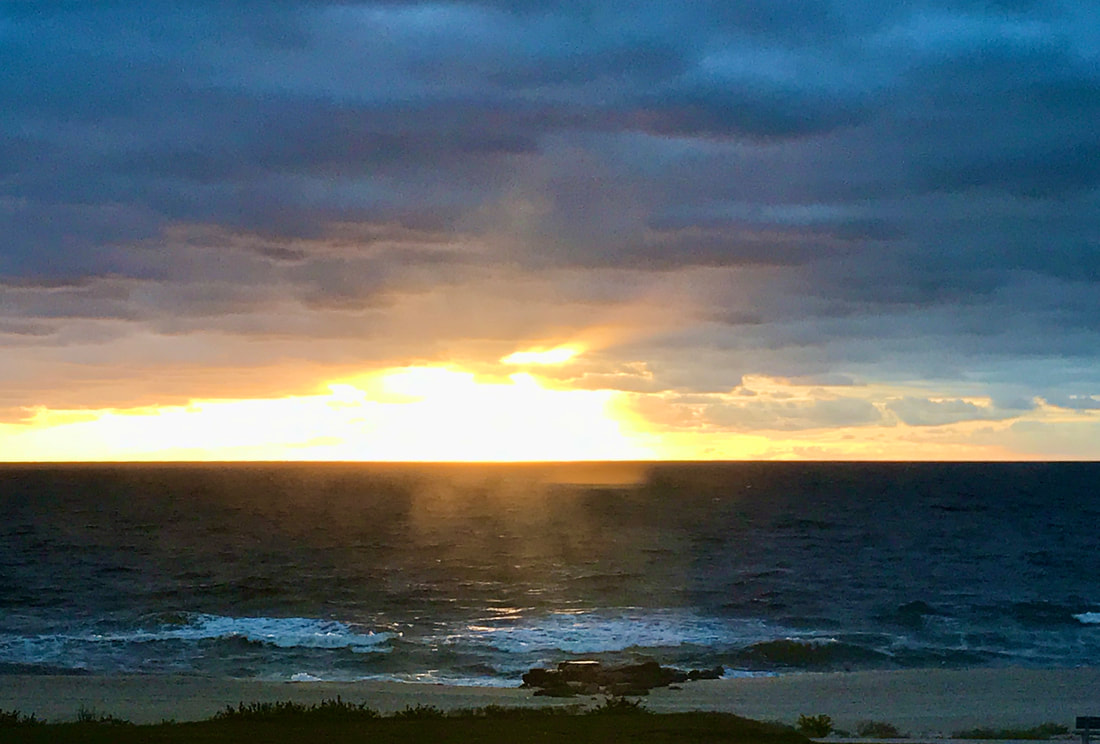|
In the last days, God says, I will pour out my Spirit on all people. Your sons and daughters will prophesy. Your young will see visions. Your elders will dream dreams. Joel 2.28 and Acts 2.17 CEB What we are all really asking… is how do we, who know the world needs to change, begin to practice being different? From Emergent Strategy: Shaping Change, Changing Worlds by adrienne maree brown[i] As I prepare to retire from parish ministry, I am asking questions of the future. My future, yes, but even more urgently the church’s future. The Christian church at large and Plymouth Congregational Church, United Church of Christ in particular. There is a great and subtle sea change, my friends, in the life of this human institution we call church. A sea change, a profound and notable transformation. Perhaps, before the pandemic, it was subtle, and we were not noticing it. However, now it is palpable. Especially to those of us who have dedicated our lives and careers to the care and feeding of “church.” This is not a bad thing! This is the movement of God’s Holy Spirit as the kin-dom of God, God’s realm on earth as it is in heaven, is expanded and further revealed for the transformation of creation! It is change….and change brings trepidation, even fear. We cannot continue to do things as we have always done them, yet we cling to how we have always done things because the new way seems unsure and unclear. The new way is only revealing itself one step at a time. This is why I love the scripture text that opens this reflection. From the time of the ancient Hebrew prophets to beginnings of the early church to now in the 21st century, God wants us to dream with God of new possibilities for creation, for human beings, for this institution we call church. Possibilities that bring love where there is hate, justice where there is injustice, compassion where there is intolerance, joy where there is despair. And we do not have to muster up these dreams and visions and prophesies out of our own minds and hearts alone. They will be given to us by the Spirit as we pray and work and fellowship and worship together. What are some of effects of this spiritual sea change that I am seeing that make us uncomfortable?
Finally, be aware of the new dreams and visions taking shape by welcoming the new faces you see in worship, at programming and in coffee hour. As pastors, we cannot welcome everyone on our own. Look around and reach out! And let one of the pastors know if you would like to be more integrally involved a team that welcomes and helps integrate new friends into our community. If you are new, we hope you will reach out to staff and lay leaders (deacons, book group leaders, fellowship group leaders, someone at coffee hour) and ask your questions! We are eager to get to know you and help you to get to know us! My friends, God is giving us new dreams and visions as we seek to be the loving presence of Jesus, the Christ, in the world! As we follow the ways of Jesus, may we always be open to holy possibilities! With you on the journey, [i] adrienne maree brown, Emergent Strategy: Shaping Change, Changing Worlds, (AK Press, Chico, CA: 2017, 164).
“Moving On” Maybe you expected it would come in a wave of relief—olly, olly, oxen free-- and everything would be fine. We’d be back in the familiar world of hugs and handshakes and the easy assumption of the presence of strangers. Of course it doesn’t work that way. Safer is not the same thing as safe. Which turns out to have always been more elusive than we thought. Somehow the world opens up slowly, in fits and starts, and also in an incomprehensible rush. There are more choices, and less clarity, More possibilities, but not more wisdom. You are not wrong to be tentative. You are not wrong to be bold. That’s just the way it is with grief. That is simply the nature of spring. By Lynn Ungar (4-12-22; www.lynnungar.com, used with permission) Change is rarely easy, is it? We are two years and two months from the lockdown phase of the pandemic. Life is seemingly more like the “normal” before the isolation, economic stress and fear the pandemic brought. Except for when it isn’t! We can move more freely and more often without masks. We can travel more. It is a joy to see one another. And yet, people are still dying from Covid at higher rates than from the flu. We are still waiting for a vaccine for children under 5. We are still not quite sure that another variant will raise its head and sending us back to more masking and isolation. Teachers have been working furiously this year to help children and youth catch up after two years of school on and off Zoom. Workplaces are not sure where they want workers to be – at home or in the office and they are reeling from “the Great Resignation.” I could go on and on about what is sort of normal but not functioning as it used to function. Churches are not sure what’s up with some people coming back to in person worship, others still on live-stream, others not coming back at all. Budgets are wonky as churches try to carry on and yet people have changed their giving patterns when they were only worshiping online. Yet there is an expectation in multi-staffed churches that all the programming that used to be up and running before will magically appear. Plymouth is no exception. We are just beginning to get our bearings and to see the scope of the work that will need to be done in rebuilding the programming for Christian formation, mission/service and fellowship that we had before March of 2020. Or create new programming more suitable for the times and future. All this reminds me of the Israelites as they returned from Babylon with the decree of the Babylonian king, Cyrus, they began the long work of rebuilding the temple in Jerusalem. The story of this rebuilding is told in the book of Ezra. It was a stop and start process with squabbling and uncertainty about having the right funding and the right workers. It took much longer than they had hoped. When they got the first foundations built the people sobbed and celebrated. Those who remembered the old temple sobbed because they remembered the old. Those who didn’t remember the old temple shouted for joy. Ezra 3.13 reads, “No one could distinguish the sound of the joyful shout from the sound of the people's weeping, because the people rejoiced very loudly. The sound was heard at a great distance.” It is good to know that the rejoicing was louder than the sobbing, yet I think it is important to recognize the painful aspect of rebuilding. Nothing was just as it was before. And that can be excruciating as well as exciting. As the poet Lynn Ungar (a UUA minister) writes, “That’s just the way it is with grief.” Some of us will move boldly into the changes needed and some of us will move tentatively. That’s also the nature of spring which is making its presence known to us more and more each day. Plymouth is going to look different in the coming months and years with new staff and new kinds of programming. We will not be able to just go back to how things were before. God sustained the Israelites and the temple was rebuilt. God will sustain us as we rebuild. Let us encourage and comfort one another as we grieve and rejoice – simultaneously at times, as we are tentative and bold. The transforming Spirit is making all things new! With you on the journey, AuthorThe Rev. Jane Anne Ferguson, Associate Minister, is a writer, storyteller, and contributor to Feasting on the Word, a popular biblical commentary. She is also the writer of sermon-stories.com, a lectionary-based story-commentary series. AuthorIn December 2019, Carla started her two-year designated term pastorate at Plymouth. She spent the last 5 years consulting with churches on strategic planning, conflict transformation and visioning. Before going to seminary she volunteered at her church through Stephen Ministry, visiting ministries and leading worship services at a memory care unit and a healthcare facility. Learn more about Carla here. The Holy ONE is my shepherd, I shall not want. I am led to green pastures and beside still waters; My soul is restored and I am set on right paths Even though I walk through the darkest valley, I fear no evil; for you, Holy ONE are with me; your rod and your staff — they comfort me. You prepare a table before me in the presence of my enemies; you anoint my head with oil; my cup overflows. Surely goodness and mercy shall follow me all the days of my life, and I shall dwell in Your house my whole life long.  I am reminded of the changes of life this week as the Summer Solstice, our longest day of light in the Northern hemisphere, arrives on Friday. Astrologically it is the first day of summer though weather and calendar wise we often think of June 1 as the first day. I am barely used to summer weather and already after Friday the days will begin to shorten just a bit each day till we reach the Winter Solstice. Our most ancient ancestors intimately knew these astrological changes. These changes indicated growing seasons and harvest, times to be fallow, times to seek shelter from storms, times to celebrate, times to mourn, times to pray. Whether we measure our seasons astrologically or meteorologically, by calendars, or by work or school schedules, we live our lives in the midst of change. Each day is a series of changes in light, time and activity which we move through almost without thinking. So we could choose to be very open to all kinds of change as it comes to us. Life is change. And yet we are likely to be resistant to any change that brings even a hint of discomfort, any change that invites a new way to move through one of our routines, any change that rearranges the status quo of a beloved community. Some changes, such as illness, death, divorce, moving are so large that they bring understandable grief. Other changes come that are just not “the way things used to be done” or the way they “should be done because they have always been done this other way.” These changes can stretch us as much as the ones that bring us grief. In his book, Quietly Courageous; Leading the Church in a Changing World, Gil Rendle writes of the changes challenging the church in our times. Those of us who were around in the last part of the 20th century experienced a convergent culture during and after World War II. This was a time in America when the people tended to converge, pull together to work for the common good of the country, of the community, the church, the family. This was a culture of joining institutions that built community through the joys and responsibilities of membership. The flip side, of course, was that important differences were swept under the rug so as not to rock the status quo. As the 20th century wound down starting in late 60s, our culture shifted to a divergent culture. In a divergent culture the social contract moves from seeking membership in societal institutions to seeking individual well-being. Now in the 21st century “the correct way to get on with life is to recognize that each of us has the right to live as he or she pleases so long as we do not interfere with the right of the other people to do likewise.”[i] The celebration is that differences are no longer swept under the rug but are free to be expressed! Historically, strong churches have been built with the social contract of a convergent culture, the culture of the group. But that time has gone. Now we live as the church in a culture of the individual. This is neither good not bad....it just IS. It is the cultural change that we are dealing with as church in the 21st century. We can no longer just say, “The problem is membership. There must be a specific solution from back in the day, from the way we used to do things. If we just return to _______ (fill in the blank), we can rebuild our church membership.” We are learning to say, “Here is our new situation in this new divergent culture. Let’s bring together all our diverse ideas and seek God’s ideas for our changing times. What are the new ways, maybe, some old ways, and more importantly, ways we haven’t yet encountered in which God is leading us to be and build the Body of Christ in the world?” Rendle’s book encourages us to be “quietly courageous” as we lead one another into the future. I paraphrased Psalm 23 at the beginning of this reflection because it is a song of encouragement for quiet courage, a song that reminds us that through all changes God accompanies us. We are never left alone! As you move through the changes of your life, as we change and grow at Plymouth, may we always remember the “Accompanying God” of this psalm. I also leave you with words from a prayer by the late William Coffin, a former pastor of Riverside Church in NYC and a former chaplain at Yale University. O God, whose mercy is ever faithful and every sure, who art our refuge and our strength in time of trouble, visit us.... We need a hope that is made wise by experience and is undaunted by disappointment. We need an anxiety about the future that shows us new ways to look at new things, but does not unnerve us... [ii] May the words of the psalmist and the words of the pastor send you forth into the inevitable changes of life “with a gladsome mind, free and joyful in the spirit of Jesus [the] Christ!”[iii] Blessings, Jane Anne [i] Gil Rendle, Quietly Courageous; Leading the Church in a Changing World, (Rowman & Littlefield, New York, NY, 2019, 46.) [ii] Ibid., 10. [iii] Ibid., 11. AuthorThe Rev. Jane Anne Ferguson, Associate Minister, is a writer, storyteller, and contributor to Feasting on the Word, a popular biblical commentary. She is also the writer of sermon-stories.com, a lectionary-based story-commentary series. Read more |
Details
|



 RSS Feed
RSS Feed